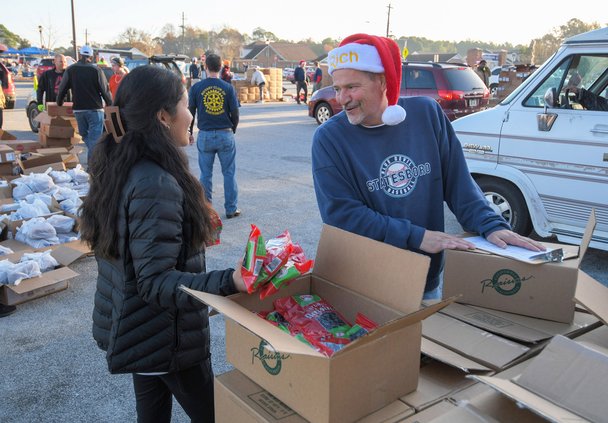Since its late 2020 transformation from serving turkey dinners only at Thanksgiving into a continuing effort to provide a week’s worth of groceries to families at massive monthly food drops, Feed the Boro has served typically 1,000 families a month for more than 34 months.
The quantity of food loaded into each car is calculated to provide two nutritious meals a day for a family of four for seven days, so that’s 56,000 meals a month. With the food drop to be held on the Statesboro High School parking lots Saturday, Feb. 3, Feed the Boro will easily surpass the milestone of 2 million meals distributed since November 2020. As usual, the food distribution is scheduled to begin around 8 a.m., but recipients usually begin lining up in their family vehicles much earlier.
Telling Statesboro’s mayor and council about the upcoming milestone, Feed the Boro President Don Poe had done a little math to produce a striking image. How far would 2 million meals reach if you could serve them all at one long table?
“The way I look at it is, if you were to take an average dinner plate and lay them side-by-side, it would stretch from (Statesboro City Hall) all the way to Atlanta, Georgia, and through Atlanta, Georgia, to Chattanooga,” Poe said.
All-volunteer still
Although organized as a 501(c)(3) charitable nonprofit corporation, Feed the Boro has no paid staff. Poe and the 15 committee members are volunteers, and typically 75-100 volunteers turn out to help organize and load food into families’ vehicles at a food drop like the one coming up.
Mayor Jonathan McCollar, who back in January 2021 presented the Key to the City to Poe for Feed the Boro’s efforts in those first food drops during the pandemic, had no new awards for the group at the recent meeting. But he expressed appreciation for the organization’s continued work and praised Poe’s efficiency in organizing food drops with volunteer labor.
“We want to say that this is not an easy feat,” McCollar said. “You turn citizens into a military unit when it comes to passing out food to those that come and receive those opportunities. So we do want to say, ‘Thank you,’ because we know that this is a labor of love for you and your entire group.”

Poe quipped that Feed the Boro has become “the Chick-fil-A of the food giveaway business” with its drive-thru efficiency.
Referring the to the 2-million-meal achievement, Poe told city officials, “We appreciate the past council’s help in making that happen. We would be happy to accept another one from you. We’re a nonprofit, and it takes money to make it happen. But I want to say thank you to you, and we appreciate your help.”
City Council had directed $13,000 of federal Coronavirus Relief Fund money to purchase food for three food drops back in January, February and March 2021. But after that, Feed the Boro reverted to being an all-privately funded effort. The city and county governments later directed other pandemic-related federal grant money, totaling $1 million, toward providing a building for the separate Statesboro Food Bank.
Food supplies for a food drop cost about $5,000, Poe says, with Feed the Boro purchasing most of the canned and packaged items from Second Harvest of Coastal Georgia, the regional food bank in Savannah. As is typical, two tractor-trailer truckloads and one box truck of food from that source are on order for the Feb. 3 drop, Poe said.
Food Lion sponsorship
Additionally, Feed the Boro’s current presenting sponsor for its food drops, Food Lion Inc., will be sending a “a whole semi truck” of fresh produce, he said. Other sponsors for this particular drop include Georgia Southern University’s APEX program for student athletes and The Islands apartment complex.
“Without Food Lion and other local organizations and private donations, obviously we couldn’t do it,” Poe told the Statesboro Herald.
The Feb. 3 distribution will include some special guests for celebration of the 2 millionth meal. Otherwise, it will follow the usual plan. Food items are set out on shipping pallets. Recipients drive slowly, with trunks open, for volunteers to place a food item into each vehicle before it proceeds slowly to the loading point for the next item.
Recipients are asked to fill out a simple form with information about their household while they are waiting. This takes just two or three minutes, he said, and no income verification is required.
“We’ve never turned away anybody because of what’s on the form, and we’ve never turned away anybody, it doesn’t matter what kind of car you show up in,” Poe said.
Feed the Boro should have enough food for the first 1,000 households, but some items do run out, and it’s often all gone in a couple of hours.
“We do encourage people to get in line early. …,” Poe said. “I get there about 3:30 in the morning to start setting signage up and just getting it prepped and ready for the trucks to come in, and in the 34 months I’ve done this there’s only been one time that I was the first person there.”
Often, 75 to 150 cars are already in line when he arrives, he said. He sees the fact that some people are willing to sit in their cars all night long for the food as proof that they “aren’t there to scam the system. The need is really there.”
For 25 years, Feed the Boro, as originally established by the late Jimmy Anthony and Gracewood Baptist Church, grew as a seasonal effort, involving more churches, civic groups and volunteers, to prepare dinners with turkey and all the trimmings for delivery to people in need on Thanksgiving Day. That became impossible in 2020 with the pandemic shutdown and restrictions on public gatherings. So Poe, who had started working with the original effort about six years ago, and DeWayne Grice of Bulloch County VOAD, or Voluntary Organizations Active in Disaster, proposed using Feed the Boro’s network of donors and volunteers to provide food drops instead.
“We kind of thought it was just going to be one and done, but once we did the first one we realized what the need was in this community,” Poe said. “We were overwhelmed with the amount of people that showed up for that food, and it has never slowed down.”

